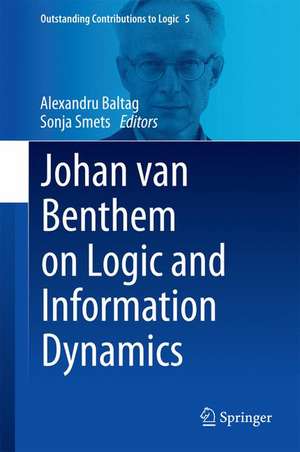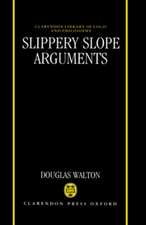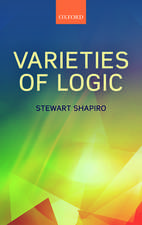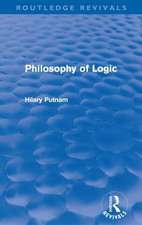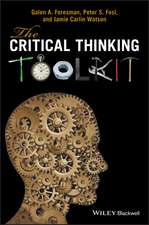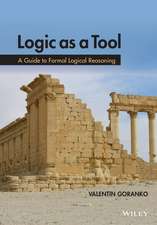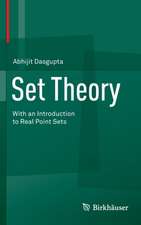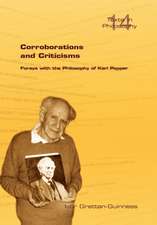Johan van Benthem on Logic and Information Dynamics: Outstanding Contributions to Logic, cartea 5
Editat de Alexandru Baltag, Sonja Smetsen Limba Engleză Hardback – 8 sep 2014
The theme of this book lies at the interface of many disciplines. Logic is the main methodology, but the various chapters cross easily between mathematics, computer science, philosophy, linguistics, cognitive and social sciences, while also ranging from pure theory to empirical work. Accordingly, the authors of this book represent a wide variety of original thinkers from different research communities. And their interconnected themes challenge at the same time how we think of logic, philosophy and computation.
Thus, very much in line with van Benthem's work over many decades, the volume shows how all these disciplines forma natural unity in the perspective of dynamic logicians (broadly conceived) exploring their new themes today. And at the same time, in doing so, it offers a broader conception of logic with a certain grandeur, moving its horizons beyond the traditional study of consequence relations.
| Toate formatele și edițiile | Preț | Express |
|---|---|---|
| Paperback (1) | 1254.68 lei 6-8 săpt. | |
| Springer International Publishing – 22 sep 2016 | 1254.68 lei 6-8 săpt. | |
| Hardback (1) | 1261.46 lei 6-8 săpt. | |
| Springer International Publishing – 8 sep 2014 | 1261.46 lei 6-8 săpt. |
Din seria Outstanding Contributions to Logic
-
 Preț: 311.62 lei
Preț: 311.62 lei - 18%
 Preț: 1053.10 lei
Preț: 1053.10 lei - 15%
 Preț: 650.19 lei
Preț: 650.19 lei - 18%
 Preț: 904.28 lei
Preț: 904.28 lei - 15%
 Preț: 707.13 lei
Preț: 707.13 lei - 18%
 Preț: 1021.68 lei
Preț: 1021.68 lei - 18%
 Preț: 1129.96 lei
Preț: 1129.96 lei - 15%
 Preț: 698.47 lei
Preț: 698.47 lei -
 Preț: 400.65 lei
Preț: 400.65 lei - 18%
 Preț: 906.96 lei
Preț: 906.96 lei - 18%
 Preț: 1018.87 lei
Preț: 1018.87 lei - 15%
 Preț: 651.67 lei
Preț: 651.67 lei -
 Preț: 435.76 lei
Preț: 435.76 lei - 18%
 Preț: 789.20 lei
Preț: 789.20 lei - 18%
 Preț: 894.03 lei
Preț: 894.03 lei - 18%
 Preț: 904.43 lei
Preț: 904.43 lei - 18%
 Preț: 894.34 lei
Preț: 894.34 lei - 18%
 Preț: 891.48 lei
Preț: 891.48 lei - 18%
 Preț: 757.47 lei
Preț: 757.47 lei -
 Preț: 365.33 lei
Preț: 365.33 lei - 18%
 Preț: 957.75 lei
Preț: 957.75 lei - 18%
 Preț: 958.07 lei
Preț: 958.07 lei - 15%
 Preț: 648.24 lei
Preț: 648.24 lei - 15%
 Preț: 648.42 lei
Preț: 648.42 lei - 15%
 Preț: 655.45 lei
Preț: 655.45 lei - 20%
 Preț: 587.28 lei
Preț: 587.28 lei - 18%
 Preț: 732.84 lei
Preț: 732.84 lei
Preț: 1261.46 lei
Preț vechi: 1538.37 lei
-18% Nou
Puncte Express: 1892
Preț estimativ în valută:
241.41€ • 251.72$ • 200.63£
241.41€ • 251.72$ • 200.63£
Carte tipărită la comandă
Livrare economică 20 martie-03 aprilie
Preluare comenzi: 021 569.72.76
Specificații
ISBN-13: 9783319060248
ISBN-10: 3319060244
Pagini: 1096
Ilustrații: XIII, 1027 p. 115 illus.
Dimensiuni: 155 x 235 x 48 mm
Greutate: 1.7 kg
Ediția:2014
Editura: Springer International Publishing
Colecția Springer
Seria Outstanding Contributions to Logic
Locul publicării:Cham, Switzerland
ISBN-10: 3319060244
Pagini: 1096
Ilustrații: XIII, 1027 p. 115 illus.
Dimensiuni: 155 x 235 x 48 mm
Greutate: 1.7 kg
Ediția:2014
Editura: Springer International Publishing
Colecția Springer
Seria Outstanding Contributions to Logic
Locul publicării:Cham, Switzerland
Public țintă
ResearchCuprins
Preface; Johan van Benthem.- Introduction; Alexandru Baltag and Sonja Smets.- Part I. Mathematical and Computational Perspectives.- The Freedoms of (Guarded) Bisimulation; Erich Grädel and Martin Otto.- Expressiveness Modulo Bisimilarity: A Coalgebraic Perspective; Yde Venema.- Schema Mappings: A Case of Logical Dynamics in Database Theory; Balder ten Cate and Phokion G. Kolaitis.- On Dependence Logic; Pietro Galliani, Jouko Väänänen.- Intensionality, Definability and Computation; Samson Abramsky.- Comparing Theories: The Dynamics of Changing Vocabulary; Hajnal Andréka and István Németi.- Part II. Dynamics of Knowledge and Belief Over Time.- Dynamic Epistemic Logics; Jan van Eijck.- Belief Revision and Dynamic Logic; Patrick Girard and Hans Rott.- Temporal Aspects of the Dynamics of Knowledge; Valentin Goranko and Eric Pacuit.- Logic and Learning; Nina Gierasimczuk, Vincent F. Hendricks, and Dick de Jongh.- A Computational Learning Semantics for Inductive Empirical Knowledge; Kevin T. Kelly.- Structures for Epistemic Logic; Nick Bezhanishvili and Wiebe van der Hoek.- Logic and Probabilistic Update; Lorenz Demey and Barteld Kooi.- Belief as a Simplification of Probability, and What This Entails; Hannes Leitgeb.- Part III. Games.- Logic and Game Theory; Giacomo Bonanno and Cédric Dégremont.- Knowledge Games and Coalitional Abilities; Thomas ågotnes and Hans van Ditmarsch.- On Definitive Solutions of Strategic Games; Sergei Artemov.- Logical Player Types for a Theory of Play; Ram Ramanujam.- An Alternative Analysis of Signaling Games; Gabriel Sandu.- Part IV. Agency.- Them and Us: Autonomous Agents in Vivo and in Silico; Peter Millican and Michael Wooldridge.- Incorporating Action Models into the Situation Calculus; Yongmei Liu and Hector J. Levesque.- Roles, Rigidity, and Quantification in Epistemic Logic; Wesley H. Holliday and John Perry.- Stit Logics, Games, Knowledge, and Freedom; Roberto Ciuni and John Horty.- The Logic of Best Actions from aDeontic Perspective; Olivier Roy, Albert J.J. Anglberger and Norbert Gratzl.- When Are Two Arguments the Same? Equivalence in Abstract Argumentation; Dov Gabbay and Davide Grossi.- Part V. Language and Cognition.- Three Etudes on Logical Dynamics and the Program of Natural Logic; Lawrence S. Moss.- From Good to Better: Using Contextual Shifts to Define Preference in Terms of Monadic Value; Sven Ove Hansson and Fenrong Liu.- Arguing about Dynamic Meaning; Martin Stokhof.- Logic of and for Language, and Logic of and for Mind; Hans Kamp.- Logic and Complexity in Cognitive Science; Alistair M.C. Isaac and Jakub Szymanik and Rineke Verbrugge.- Computational Complexity and Cognitive Science: How the Body and the World Help the Mind be Efficient; Peter Gärdenfors.- Part VI. Styles of Reasoning.- Dynamic vs. Classical consequence; Denis Bonnay and Dag Westerståhl.- Dynamic Epistemic Logic as a Substructural Logic; Guillaume Aucher.- Arrows Pointing at Arrows: Arrow Logic, Relevance Logic, and Relation Algebras; J. Michael Dunn.- Situation Theory Reconsidered; Jeremy Seligman.- Unified Correspondence; Willem Conradie, Silvio Ghilardi, Alessandra Palmigiano.- Conclusions.- Reflections; Johan van Benthem.- Scientific Autobiography; Johan van Benthem.- Bibliography.- Publications.
Recenzii
From the book reviews:
“The breadth and depth of coverage is such that there will be something of interest for many, whether you are a PhD student simply keen to absorb fascinating historical context set in a broad sweep of technical results--only some of which you may wish to engage with in detail--or an experienced logician looking to gain an appreciation of contemporary approaches to using logic to model a multitude of elements of reasoning mechanics.” (L. Sonenberg, Computing Reviews, February, 2015)
“The breadth and depth of coverage is such that there will be something of interest for many, whether you are a PhD student simply keen to absorb fascinating historical context set in a broad sweep of technical results--only some of which you may wish to engage with in detail--or an experienced logician looking to gain an appreciation of contemporary approaches to using logic to model a multitude of elements of reasoning mechanics.” (L. Sonenberg, Computing Reviews, February, 2015)
Notă biografică
Alexandru Baltag is an Associate Professor at the Institute for Logic, Language and Computation (University of Amsterdam). He is known mostly for his work in logics for multi-agent information flow (– he was one of the originators of dynamic epistemic logic) and their applications to communication, game theory, epistemology etc. He also worked on non-wellfounded set theory, coalgebraic logic, logics for quantum computation, game semantics, learning theory. His MS in Mathematics was obtained in 1989 at the University of Bucharest. He received his PhD in Mathematics in 1998 at Indiana University under the supervision of Jon Barwise. Between 1998 and 2001, he was a post-doctoral researcher at the Dutch Center for Mathematics and Computer Science. Between 2001 and 2011 he was a University Lecturer at Oxford University, in the Department of Computer Science.
Sonja Smets is an associate professor at the Institute for Logic, Language and Computation at the University of Amsterdam. She obtained her PhD at the Free University of Brussels in 2001 and after a post-doctoral research position at the Flemish Fund for Scientific Research, she was a lecturer at the Free University of Brussels till 2009. In 2009 she worked as an assistant professor with a Rosalind Franklin Research Fellowship at both the Faculty of Philosophy (Dept. Theoretical Philosophy) and the Faculty of Mathematics & Natural Sciences (Multi-agent Systems Group in Artificial Intelligence) at the University of Groningen. In 2009, she received a VIDI award and in 2011 she received and ERC starters grant. Her research programme ranges over Logic (in particular non-classical logics, including non-monotonic logics, belief revision, modal and temporal logic, quantum logic); Multi-agent Systems; Formal Epistemology; Philosophy of Science, Philosophy of Quantum Physics, Quantum Information and Computation.
Sonja Smets is an associate professor at the Institute for Logic, Language and Computation at the University of Amsterdam. She obtained her PhD at the Free University of Brussels in 2001 and after a post-doctoral research position at the Flemish Fund for Scientific Research, she was a lecturer at the Free University of Brussels till 2009. In 2009 she worked as an assistant professor with a Rosalind Franklin Research Fellowship at both the Faculty of Philosophy (Dept. Theoretical Philosophy) and the Faculty of Mathematics & Natural Sciences (Multi-agent Systems Group in Artificial Intelligence) at the University of Groningen. In 2009, she received a VIDI award and in 2011 she received and ERC starters grant. Her research programme ranges over Logic (in particular non-classical logics, including non-monotonic logics, belief revision, modal and temporal logic, quantum logic); Multi-agent Systems; Formal Epistemology; Philosophy of Science, Philosophy of Quantum Physics, Quantum Information and Computation.
Textul de pe ultima copertă
This book illustrates the program of Logical-Informational Dynamics. Rational agents exploit the information available in the world in delicate ways, adopt a wide range of epistemic attitudes, and in that process, constantly change the world itself. Logical-Informational Dynamics is about logical systems putting such activities at center stage, focusing on the events by which we acquire information and change attitudes. Its contributions show many current logics of information and change at work, often in multi-agent settings where social behavior is essential, and often stressing Johan van Benthem's pioneering work in establishing this program. However, this is not a Festschrift, but a rich tapestry for a field with a wealth of strands of its own. The reader will see the state of the art in such topics as information update, belief change, preference, learning over time, and strategic interaction in games. Moreover, no tight boundary has been enforced, and some chapters add more general mathematical or philosophical foundations or links to current trends in computer science.
The theme of this book lies at the interface of many disciplines. Logic is the main methodology, but the various chapters cross easily between mathematics, computer science, philosophy, linguistics, cognitive and social sciences, while also ranging from pure theory to empirical work. Accordingly, the authors of this book represent a wide variety of original thinkers from different research communities. And their interconnected themes challenge at the same time how we think of logic, philosophy and computation.
Thus, very much in line with van Benthem's work over many decades, the volume shows how all these disciplines forma natural unity in the perspective of dynamic logicians (broadly conceived) exploring their new themes today. And at the same time, in doing so, it offers a broader conception of logic with a certain grandeur, moving its horizons beyond the traditional study of consequence relations.
The theme of this book lies at the interface of many disciplines. Logic is the main methodology, but the various chapters cross easily between mathematics, computer science, philosophy, linguistics, cognitive and social sciences, while also ranging from pure theory to empirical work. Accordingly, the authors of this book represent a wide variety of original thinkers from different research communities. And their interconnected themes challenge at the same time how we think of logic, philosophy and computation.
Thus, very much in line with van Benthem's work over many decades, the volume shows how all these disciplines forma natural unity in the perspective of dynamic logicians (broadly conceived) exploring their new themes today. And at the same time, in doing so, it offers a broader conception of logic with a certain grandeur, moving its horizons beyond the traditional study of consequence relations.
Caracteristici
Illustrates the program of Logical-Informational Dynamics and Johan van Benthem’s work in its establishment Discusses the state of the art in such topics as information update, belief change, preference, learning over time and strategic interaction in games Offers contributions from experts in logic, but also disciplines such as mathematics, computer science and philosophy
